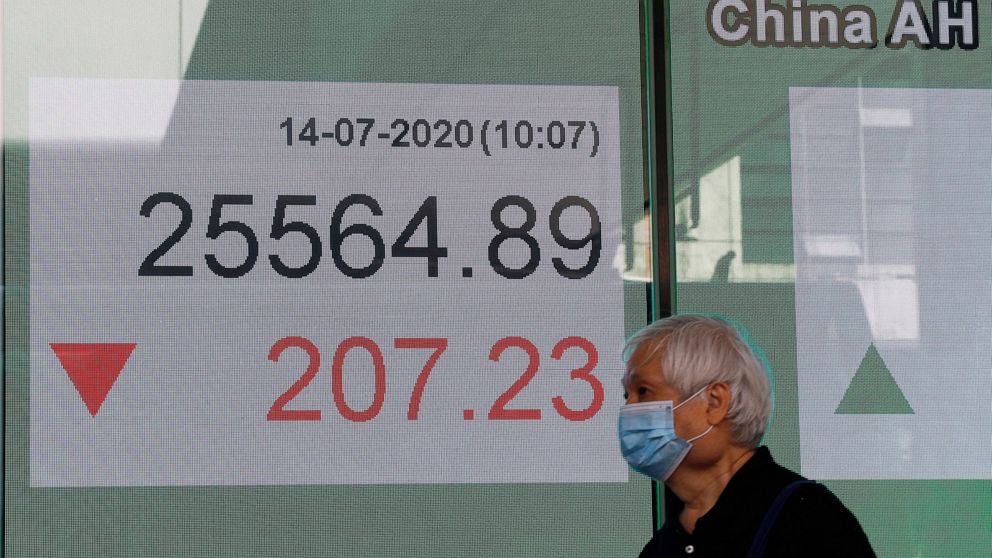Wall Street stays unsettled as bank earnings reports roll in
Wall Street is flipping between gains and losses Tuesday after CEOs of the country’s biggest banks painted a mixed picture of how badly the coronavirus pandemic is ripping through their businesses
By
STAN CHOE AP Business Writer
July 14, 2020, 3:26 PM
4 min read
NEW YORK — Wall Street is flipping between gains and losses Tuesday after CEOs of the country’s biggest banks painted a mixed picture of how badly the coronavirus pandemic is ripping through their businesses.
The S&P 500 was virtually flat, as of 11:02 a.m. Eastern time, after earlier being down 0.9% and then up 0.4%. It follows up on Monday’s turbulent day where stocks veered from an early gain to a loss after California brought back restrictions on its economy amid a jump in coronavirus counts. Stocks overseas mostly fell, while Treasury yields dipped lower in another sign of pessimism about the economy.
The Dow Jones Industrial Average was up 225 points, or 0.9% at 26,311, after earlier being down 90 points. The Nasdaq composite was 0.5% lower as big tech stocks took another modest step back following what had been a remarkably resilient climb through the pandemic.
Like the broader market, financial stocks were drifting between gains and losses after three of the industry’s biggest players said they had to set aside nearly $27 billion to cover loans potentially going bad due to the recession.
But investors took very different approaches to each of them. JPMorgan Chase, the nation’s biggest bank, rose 0.4% as it reported making a record amount of revenue from April through June. Its profit for the latest quarter also managed to beat analysts’ expectations, even though it roughly halved from year-ago levels.
Wells Fargo, though, dropped 5.9% after it said it expects to cut its dividend. “Our view of the length and severity of the economic downturn has deteriorated considerably,” CEO Charlie Scharf said.
Citigroup fell 2.2% after CEO Michael Corbat said its overall business performance was strong last quarter, though net income dropped 73% from a year ago largely due to the $7.9 billion it had to set aside for loans potentially going bad.
Delta Air Lines lost 3.3% after its earnings and revenue for the latest quarter fell short of Wall Street’s already very low expectations. The pandemic is keeping fliers on the ground, and Delta’s passenger count plunged 93% during the quarter from a year earlier. CEO Ed Bastian said it could be two years before the airline sees a sustainable recovery.
Stocks have mostly churned in place since early June. That’s when the S&P 500 pulled back within 4.5% of its record high it set in February, after earlier being down nearly 34%. The index is now 6.6% below its record.
Pulling stocks higher has been a budding economic recovery, with the job market, retail sales and other measures of the economy halting their plunge and beginning to resume growth. Underlying it all is massive aid for the economy from central banks and governments around the world.
But pushing stocks down are rising coronavirus counts in hot spots around the world, which threatens to halt the recovery just as it got going. California demonstrated on Monday how dangerous that can be when the governor of the country’s largest state economy once again ordered bars, indoor dining and other businesses closed.
The worry is that the continuing pandemic could push states across the Sun Belt to roll back reopenings of their economies.
Technology stocks have stumbled in particular this week, a relatively rare move for this year. Apple, Microsoft and other tech-oriented giants have mostly cruised through the pandemic on expectations that they can continue to grow almost regardless of whether the economy is in quarantine.
The nearly nonstop rise raised worries that tech stocks had become too expensive, though, even after accounting for the huge profits that the companies produce. Tech stocks in the S&P 500 are down 2.6% so far this week. They nevertheless are still up nearly 15% for the year, the largest gain among the 11 sectors that make up the index.
In Europe, France’s CAC 40 fell 1.3%, and Germany’s DAX lost 1.1%. The FTSE 100 in London slipped 0.2%.
In Asia, Japan’s Nikkei 225 fell 0.9%, South Korea’s Kospi slipped 0.1% and Hong Kong’s Hang Seng dropped 1.1%.
The yield on the 10-year Treasury fell to 0.60% from 0.62% late Monday. It tends to move with investors’ expectations of the economy and inflation.
Benchmark U.S. crude oil rose 0.7% to $40.37 per barrel. Brent crude, the international standard, gained 0.8% to $43.05 per barrel.
![]()


